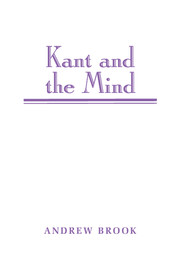Book contents
- Frontmatter
- Contents
- Preface
- 1 The contemporary relevance of Kant's work
- 2 Kant's theory of the subject
- 3 Kant's conception of awareness and self-awareness
- 4 Kant's theory of apperceptive self-awareness
- 5 The mind in the Critique of Pure Reason
- 6 The first-edition subjective deduction: the object of ‘one experience’
- 7 Kant's diagnosis of the Second Paralogism
- 8 The Third Paralogism: unity without identity over time
- 9 The second-edition subjective deduction: self-representing representations
- 10 Nature and awareness of the self
- Notes
- Bibliography
- Index of passages cited
- General index
10 - Nature and awareness of the self
Published online by Cambridge University Press: 05 June 2012
- Frontmatter
- Contents
- Preface
- 1 The contemporary relevance of Kant's work
- 2 Kant's theory of the subject
- 3 Kant's conception of awareness and self-awareness
- 4 Kant's theory of apperceptive self-awareness
- 5 The mind in the Critique of Pure Reason
- 6 The first-edition subjective deduction: the object of ‘one experience’
- 7 Kant's diagnosis of the Second Paralogism
- 8 The Third Paralogism: unity without identity over time
- 9 The second-edition subjective deduction: self-representing representations
- 10 Nature and awareness of the self
- Notes
- Bibliography
- Index of passages cited
- General index
Summary
The task of this chapter is to examine the second set of remarks on the mind new to the second-edition TD, the ones beginning half-way through §24 and running to the end of §25 (B153–9). The most interesting thing about these remarks is that Kant seems to indicate in them that we are directly aware of our actual selves, not just representations of self, apparently in flagrant violation of his doctrine of the unknowability of the noumenal mind. In my view, not only do these remarks not violate his claim that we have no knowledge of the mind, they are of real interest in their own right. Before we turn to them, I want to look at an important challenge to all standard readings of Kant's view of the mind, and also to mine. On all standard readings, Kant at least saw the mind as a single entity in some significant sense. (Even a global representation is a single entity: it is individuated, meets clear criteria for identity at a time, and comes complete with important unity and continuities over time.) The challenge comes from Patricia Kitcher. Kant's real view, she tells us, was that there is no subject, not in any sense that entails that it is a significantly unified entity. Kant's ‘I’ is nothing more than a contentually interconnected “system of diverse states”:
In conceiving of mental states we must think of them as belonging to a continuing interdependent system, hence we talk about a continuing consciousness or I, we use the representation ‘I’…. [However,] … there is in fact no inner intuition of a self.
- Type
- Chapter
- Information
- Kant and the Mind , pp. 235 - 259Publisher: Cambridge University PressPrint publication year: 1994



